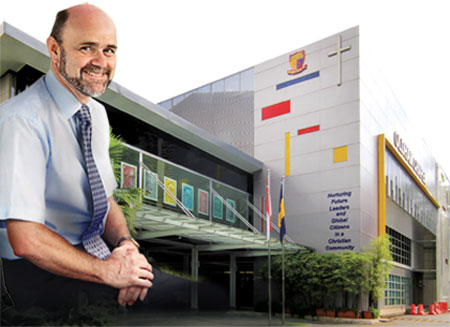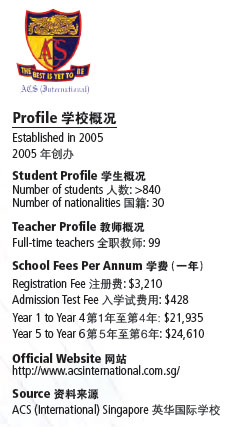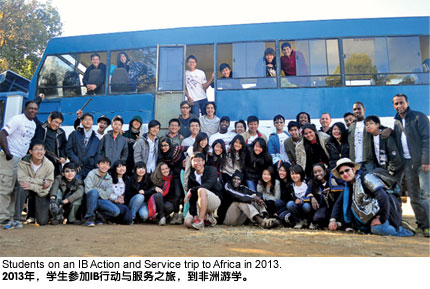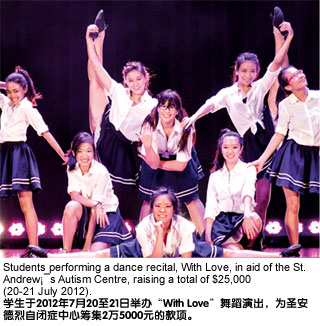 
Anglo-Chinese School (International) Singapore delivers a culturally diverse education by following the local education system within an international environment.
If education can be perceived as an extension of a lifestyle, Principal of Anglo-Chinese School (International) Singapore Mr Kerr Fulton-Peebles’ opinion is that the pace of life in Singapore appears to be “frenetic and restless”.
“When I first mentioned that I was coming out to Singapore a few years back, people who had experienced education here hinted at a slightly competitive element, which to me, now comes through quite strongly, even in this School that is strictly speaking not under the Ministry of Education (MOE),” said Mr Fulton-Peebles, who has had experience of the British, American and French systems prior to his move here.
“There is often viable criticism of the Western world being too relaxed and some may feel that we’ve been a little slack regarding some standards. I am not entirely convinced by that argument, particularly in some schools where the British or American independent systems are amongst the best in the world. Yes, there can be a slippage of some sorts within state systems. But arguably, youngsters here in Singapore really need a little room to grow.”
His observation is pertinent to the changing climate of Singapore, where the MOE is working towards a more holistic calibrate in which the importance of education in the 21st century is not just about becoming number one — a belief that both Principal and staff at ACS (International) would strongly endorse.
An All-round Education
The School was founded eight years ago as part of a move to introduce more diversity into the Singapore education system and besides Singaporeans it has attracted a large number of students from the region. Their parents, who often have an international mindset, trust that the School can meet their expectations of setting high challenges for their children, without putting excessive pressure on them.
The School’s curriculum sees students take the Cambridge IGCSE (International General Certificate of Secondary Education) before moving on to the International Baccalaureate programme, which fundamentally aims to prepare 16–18-year-olds for an all-round university experience.
So that each student benefits from individual attention class sizes are kept as small as possible, usually numbering between 20 and 25. The School’s choice to practise assessment for learning is also in line with this philosophy in that learning in any topic is customised to the pace and needs of the individual student.
“I’m very keen to really push the development of music, art and drama, which we’re beginning to achieve a bit of expertise in. But most importantly, our philosophy is that every student has his or her own talent, and during his or her formative years, it is the School’s responsibility to provide variety of all sorts so as to draw that jewel out and polish its different facets,” Mr Fulton-Peebles added.
A Culture of Character
The formative years of a child’s life are those when he or she is most receptive. It is for this reason that ACS (International) is keen to provide a broad and diverse range of educational inputs.
The student body itself is diverse and there is a balance of local and foreign students which creates a multi-cultural learning environment. The overseas contingent hails from 35 different countries which makes the School truly international in feel.
While the bulk of the teaching body is presently Singaporean, ACS (International) is committed to engaging local and foreign teachers with international teaching experience to meet individual subject requirements.
“Since the School operates on a Singaporean base, we all say that we’re Singaporean, but we are proud of the international dimension, because what is really good is that between us we can draw on a huge range of experiences,” Mr Fulton-Peebles said.
 At ground level, this diversity enriches the classroom experience. “If a teacher is talking about volcanic activity, you are likely to find someone in the class who has lived through it and can tell the class what it is like, making it feel interesting to digest what they learn in textbooks. At ground level, this diversity enriches the classroom experience. “If a teacher is talking about volcanic activity, you are likely to find someone in the class who has lived through it and can tell the class what it is like, making it feel interesting to digest what they learn in textbooks.
“The students can also see in reality the richness of the economic front: they witness the effects of economic growth in China because we have Chinese students coming from well-to-do family backgrounds, and they also know for a fact that there aren’t so many Japanese coming here because their economy is presently encountering difficulties.
“There are all sorts of things one can draw into lessons — that’s definitely a benefit of having a strong international perspective. I personally find it very invigorating and we like to transfer this understanding to our students. I believe it can contribute to enhancing interpersonal relationships.”
From a wider angle, the immersion in an international environment necessarily produces a more global outlook but the teachers at ACS (International) also take the opportunity, wherever possible, to encourage global ideals like social cohesion and world peace.
“The whole reason for us having a school like this is our faith that if young people from all over the world work together at this stage, when they get to adulthood they’re more likely to be work co-operative.
“When you think of a situation where China and Vietnam clash over issues such as the South China Sea, who is to say that in 20 years’ time, such disputes will still be going on if young people are educated in the right way? Drawing strength from a universal understanding and knowledge, they may come to speak the same values language and resolve things in the harmonious, effective way they were taught to do here rather than just fight mindlessly. I take for example a case when one student introduced himself as Taiwanese and the other Chinese, and I said, ‘You should be fighting each other, shouldn’t you?’ In response, they grinned at each other and went, ‘No, no, no, definitely not.’ And I thought, joking aside, that that said an awful lot about how the future can pan out if we, as educators, engender in them a culture of character.”
Creating a culture of character also extends to allowing students choose their own co-curricular activity (CCA). Students try as many activities as they like, develop them at their own pace, and only gradually narrow down their area of focus. For an eight-year-old school with approximately 840 students, ACS (International) has more than 30 CCAs for students to pick from.
The benefits are that with the guidance of expert teachers, the students themselves fuel their own passion, and a number of previously unexplored activities can become a major feature of a student’s life at the School.
“A case in point is that netball was not popular here, and neither was volleyball. We brought in new Physical Education staff with these specialisms and developed teams in each sport. Within six months, as membership went up, standards levelled up too, and they were winning at inter-school competitions.”
The School’s accent on diversity, coupled with a strong track record, has earned it recognition.
“A lot of parents have said to me that one of the things they like best in such a young school is that we’ve got so many different CCAs. Also, the Council of International Schools team that specially came to inspect us commented that this is a remarkably good range and thinks it is important to continue with that.
“Since talent is a positive result of deeper self-awareness, it yields amazing dividends on the performance front. And the only way to do that is by providing more variety: a variety of different approaches and a variety of different subjects. Everything comes together when a wholesome culture of character is established.”
Challenges of Diverse Settings
And yet, in a diverse setting, the issue of culture can get thorny.
Mr Fulton-Peebles said, “Surprisingly, the religious element is not a source of tension at all, although we are emphatically a mission school. The cultural aspects — tension, perhaps not, but one has to make allowances.
“It could be a really simple thing such as learning to address, for example, an Indian mother by the right name. And I learnt it the hard way, because I did not understand how to do that and it created offence. Such situations can be immensely difficult to resolve but one is given the opportunity here to condition oneself to avoid committing such faux pas.
“Sometimes people also tend to be very cliquish and want to chatter in their own mother tongue, making others feel left out, but that’s natural because people enjoy familiarity, especially when they’re far away from home.
“However, I think this example demonstrates one very significant fact: the whole subtext that consists of unsaid things which only some people can understand tells us that there are specifics in the ways of doing things. We handle our cards in one way, that’s obvious, but how we deal with people is completely different.
“And I think that’s what our students will learn from their education here, that inside and out of the classroom, all these subtle cultural nuances are very important in fostering international relations and avoiding conflict.”
The School promotes cultural exchange in many ways. In April 2011, for instance, ACS (International) hosted the Humanities Youth Conference, which provided a forum for discussion on defence, resource and political issues in Southeast Asia. Needless to say, the students could relate to these on many levels.
Mr Fulton-Peebles is also aware that cultural stereotypes can either make or break one’s education strategies, depending on the degree to which teachers heed them and how carefully they are handled.
“If one looks at this issue from the UK perspective, one would say that all Asians are hardworking; all they do is work and all they do is Maths. But these are both stereotypes and not true at all.
“So the teacher has to be very much in control of things and make sure that every student is given every opportunity to develop. Indeed, every classroom is a platform to properly hone and expand our mixed-ability teaching, which we are very involved in.”
Blurring Distinctions
At present, international schools and MOE-regulated schools differ largely in terms of the disparity in school fees, logistical areas like manpower, and the teacher-to-student ratio. But the lines are blurring.
With the advent of the Professional Learning Communities that are now being formed MOE schools are finding out the benefits of the type of education which ACS (International) offers, and vice versa. As different ideologies move laterally, known gaps are beginning to close.
“We have a sharing session with MOE once a year and they do have a say in approving our teachers as well as the courses we deliver. But far from being intrusive, their role is one that is very co-operative. And I think it’s been very refreshing to come to a country where there isn’t an antipathy between private and government schools.”
However, despite the fact that there may be a blurring of boundaries and philosophies between the different school systems, Mr Fulton-Peebles is mindful that the School has to stand out.
“We have to ensure that we are different. Hence, I’m very keen, for example, to really push the development of liberal arts, even as a non-academic focus, because that’s a niche market that would nurture the best of soft skills and open up a range of potential specialisms for our students.”
Catering to a Wider Range of Abilities
 Instead of accepting just the brightest academic students, Mr Fulton-Peebles also wants to cater to students who will benefit most from the experience ACS (International) offers. Instead of accepting just the brightest academic students, Mr Fulton-Peebles also wants to cater to students who will benefit most from the experience ACS (International) offers.
“It is a fact that we accept kids of a wider ability range, and we do that quite deliberately. It doesn’t matter, because what we look for is the experience and how it relates to a particular child. And it has been established that these students thrive here, simply because we have a completely different approach that is suitable for them.
“There have been students who wanted a place here instead of remaining in ACS (Independent) and ended up doing much better. Also, a good case study would be a British applicant who had been in Singapore for a long time and scored less than 200 in the local Primary School Leaving Examination, but we gave her a chance because we believed she would be able to cope with the content and pace of the lessons.
“It was a correct decision. She was with us for four years and ended up with 4 As, 2 Bs and a C. In our view, she did better here than she would ever have done elsewhere. Instead of an escape route, I would say this was nothing short of a mission — fulfilled of course.”
|